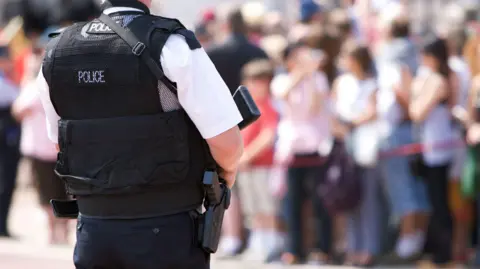Officers on trial over shooting suspects to get anonymity
 Getty Images
Getty ImagesFirearms officers facing trial over shooting suspects are to be given anonymity unless they are convicted, under reforms announced by the home secretary.
Yvette Cooper's announcement comes days after police officer Martyn Blake was cleared of murdering Chris Kaba, who was shot in the head during a vehicle stop in Streatham, London, in September 2022.
Cooper said there would be a "presumption of anonymity for firearms officers subject to criminal trial". The Home Office said later the right was still "subject to judicial discretion in individual cases".
Cooper added the Kaba case came against a "backdrop of longstanding concerns" about police accountability, standards and confidence.
The reform is part of a new package aimed at improving police accountability, and includes several measures proposed by the previous government in March.
They include:
- Speeding up the process for the Independent Office of Police Conduct (IOPC) watchdog to send cases to the Crown Prosecution Service (CPS).
- Raising the threshold for the IOPC to refer officers to the CPS
- A "presumption of dismissal" for officers found guilty of particular criminal offences.
A national lessons learned database for deaths or serious injuries following police contact or pursuits will be created, so that findings can be incorporated into future training.
There will also be reforms to strengthen police vetting and misconduct.
Cooper said there would also be an "appeal mechanism" for bereaved families when a decision is made not to seek a charging decision.
A review into thresholds for inquests and inquiries into deaths will be led by Adrian Fulford, a former senior judge, and Tim Godwin, the acting commissioner of the Met during the 2011 riots, which took place after the police shooting of Mark Duggan.
The review will consider whether the standard required for an inquest to conclude someone was unlawfully killed should be raised.
The home secretary said the measures were "practical steps to rebuild confidence, tackle delays, provide clarity and ensure high standards are maintained".
James Cleverly, the shadow home secretary, argued firearms officers should be able to use their training in the role as part of their defence in criminal proceedings.
He told the Commons he "agreed with almost all" of the proposals put forward by the government and urged MPs to be "thoughtful and careful" about making statements on police decisions.
"We have seen too often police leadership bend to inappropriate levels of public pressure," he said.
Metropolitan Police Commissioner Sir Mark Rowley, whose force was involved in Mr Kaba's death, also welcomed the "crucial" proposed changes to the current system he described as "unbalanced" and failing to secure the confidence of the public and officers.
"Over many years this has created a culture where our officers are increasingly more worried about a skewed, imbalanced system than they are the dangerous criminals they face on the streets. If this continues, it risks making the public less safe," he said.
Diane Abbott, the Labour MP for Hackney and Stoke Newington, told the Commons "nothing could be more damaging for police community relations" than the idea that the police are above the law.
Habib Kadiri, executive director of fair policing research group StopWatch, said for the public's safety, "it is of utmost importance" that the review preserved the current threshold that officers must meet "when justifying a fatal use of force".
Prime Minister Sir Keir Starmer had earlier said that it was important the public had confidence in the police and the police have confidence in the government.
Under the current law, every armed police officer is personally responsible for their actions. Officers cannot use more force than is necessary to neutralise a threat.
A superior officer cannot tell a police officer to pull the trigger - nor can there be a pre-emptive tactical decision to shoot a suspect whatever the circumstances.
On Monday, police officer Mr Blake was found not guilty of murdering Mr Kaba.
The Metropolitan Police said the officer, who was suspended throughout the process, would be immediately reinstated.
The Independent Office for Police Conduct (IOPC) confirmed Mr Blake was facing a gross misconduct hearing before his criminal trial.
The watchdog said it would review its findings, taking into account evidence at the trial and any further police representations, as is standard practice when an officer is acquitted of a criminal charge.
The Met said it would make fresh representations to the IOPC and welcomed the watchdog's review "given the very real complexities of a fast-moving and pressured incident".
Mr Kaba had shot a man in a nightclub days before his own death.
Reacting to the verdict, Metropolitan Police Commissioner Sir Mark said no officer was above the law but the force had been clear "the system holding police to account is broken".
He said: "The more we crush the spirit of good officers, the less they can fight crime - that risks London becoming less safe."
The National Police Chiefs' Council and College of Policing have developed an action plan to address racism and racial disparity in policing at an institutional level.
Abimbola Johnson, a barrister who chairs an independent board set up to oversee and scrutinise the plan, warned against using the Kaba case to push for legislative change, saying it was not a "typical case".
"It is already extremely rare for us to see police officers being prosecuted under the criminal justice system for action they have conducted whilst in the line of duty," she told BBC Radio 4's Today programme.
